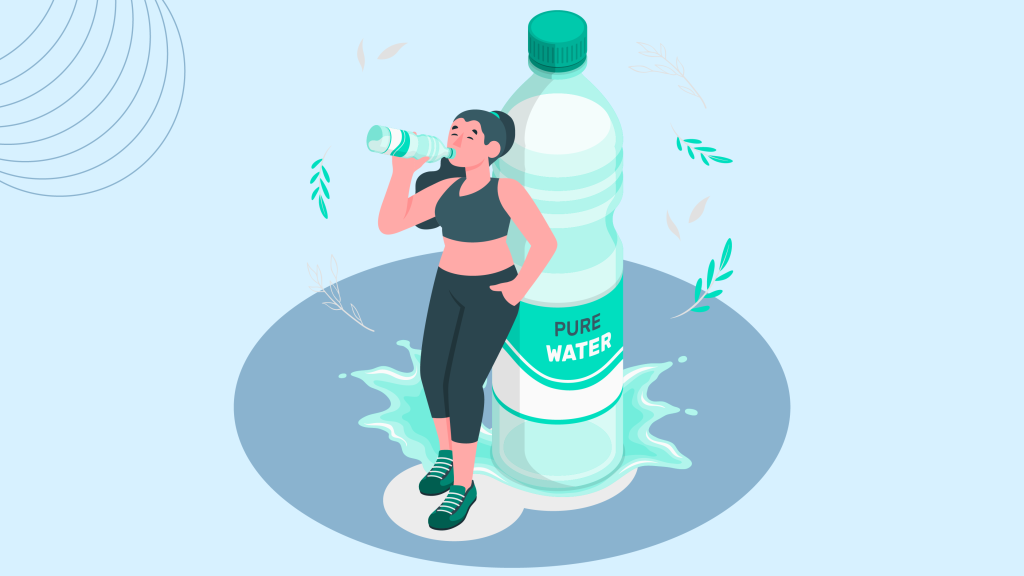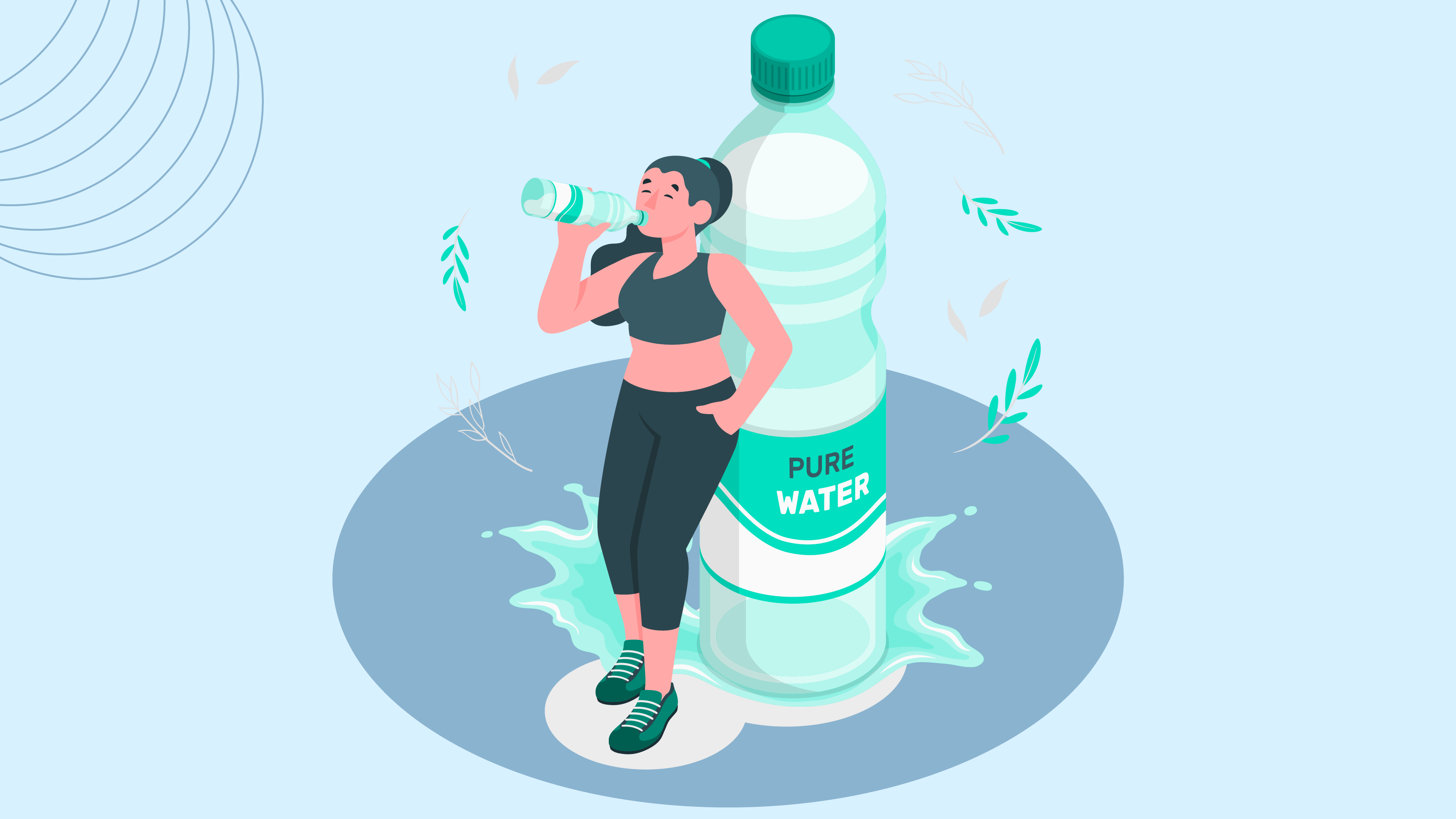
Water is essential for maintaining good health. Are you sure that you are getting enough? If not then These guidelines can help you find out.
Read More – Easy Ways In Which You Can Lower Your Blood Sugar Level Naturally
How much water should you drink on a daily basis? It’s a simple question with definitely not an easy answer.
There is no one size that fits all scenarios for this particular case . But knowing more about your body and its needs for fluids can help you in estimating how much water you should drink on a daily basis.
What are the Health Benefits of Water?
Your body’s got this crucial chemical sidekick called water, making up a hefty 50% to 70% of your body weight. Survival? Yeah, it’s pretty dependent on this liquid hero. Every cell, tissue, and organ in your body throws a party when water’s around because it helps them do their thing—flushing out waste through sweat, pee, and, you know, bathroom time, keeping your temperature in the Goldilocks zone, giving your joints a smooth ride, and wrapping up sensitive tissues in a protective hug.
Fall short on water, and you might find yourself in the world of hydration, where your body’s lacking the liquid it needs for the daily grind. Even a hint of dehydration can drag you into the tired-and-worn-out zone, stealing your energy like a sneaky bandit.
How much Water do you need?
Every single day, your body does this Houdini act, losing water through breathing, sweating, doing the bathroom tango, and, you know, the usual bodily moves. To keep the engine running smoothly, you’ve got to top up this water supply by sipping on drinks and munching on water-rich foods.
Now, how much liquid love does the average, healthy adult need in a mild climate? Well, the wizards at the U.S. National Academies of Sciences, Engineering, and Medicine say it’s around:
– Roughly 15.5 cups (that’s 3.7 liters) of fluids for the fellas.
– About 11.5 cups (or 2.7 liters) of fluids for the ladies.
And here’s the inside scoop: this magic number includes liquids from all corners, be it good ol’ water, your favorite beverages, or the water hiding out in your meals. Turns out, about one-fifth of your daily fluid fix comes from what’s on your plate, while the rest is the result of sipping and slurping throughout the day.
You might be someone who requires more water than someone else. But How much water you need then this depends upon various other factors.
There are a bunch of things that can sway how much water you need:
- Where you are: If you find yourself in a hot, humid, or dry place, or up in the mountains, you’ll be reaching for that water bottle more often.
- What you eat and drink: Knocking back a bunch of coffee or other caffeinated stuff might mean more bathroom trips and, consequently, a need for extra water. Also, if your diet is all about the salty, spicy, or sugary goodness and skips out on hydrating fruits and veggies, you might need to up your water game.
- Weather and time of year: When the mercury rises, so does your need for water. Blame it on the extra sweating.
- Your surroundings: Whether you’re soaking up the sun outdoors, stuck in a heated room, or both, your body might signal a thirst alarm sooner.
- How active you are: If your day involves a lot of moving around or working those muscles, you’ll be reaching for the water more than your desk-sitting counterpart. And if you’re hitting the gym or doing some serious exercise, you better believe your body will be screaming for hydration.
- Your health: If you’re dealing with infections, a fever, or the not-so-fun combo of vomiting and diarrhea, your body will need more water. Certain health conditions, like diabetes, and some meds, especially diuretics, can also play a role in upping your water needs.
- Baby on board: Expecting a little one or nursing? Double up on that water intake. Your body’s putting in the overtime for two (or more).
Benefits of Drinking Water
Water does a bunch of important stuff in your body. It’s like a delivery service for nutrients and oxygen to your cells and a superhero that kicks out bacteria from your bladder. When it comes to digestion, it’s the unsung hero preventing constipation. It’s also the behind-the-scenes player regulating blood pressure, giving your joints a comfy feel, and acting as a bodyguard for organs and tissues. And hey, it’s the go-to temperature controller, making sure you don’t overheat. In a nutshell, water is your body’s all-in-one maintenance crew, keeping everything running smoothly!
What about the advice to drink 8 glasses a day?
You’ve probably come across the suggestion to drink eight glasses of water a day, which is simple to remember and a reasonable target. Most healthy folks can keep themselves hydrated by drinking water and other fluids whenever they feel thirsty. For some, less than eight glasses might be sufficient, while others might need more.
Various factors can influence your total fluid intake:
1. Exercise: If you engage in activities that make you sweat, it’s essential to drink extra water to make up for the fluid loss. Remember to hydrate before, during, and after a workout.
2. Environment: Hot or humid weather can lead to increased sweating, requiring additional fluid intake. Dehydration is also a risk at high altitudes.
3. Overall health: Conditions like fever, vomiting, or diarrhea cause your body to lose fluids. In such cases, drinking more water or following a doctor’s advice, such as using oral rehydration solutions, is crucial. Conditions like bladder infections and urinary tract stones might also necessitate increased fluid intake.
4. Pregnancy and breast-feeding: If you’re pregnant or breast-feeding, you may require extra fluids to stay adequately hydrated. Adjusting your fluid intake based on your unique needs is key to maintaining good health.
Is water the only option for staying hydrated?
Absolutely! It’s not just about chugging water all day. What you eat plays a big role too. Take fruits and veggies, for instance—watermelon and spinach are practically water-packed. And it’s not just about what you munch on; beverages like milk, juice, and herbal teas are mostly water too. Surprisingly, even your cup of coffee or that soda can chip in to your daily water intake. But, word of caution, watch out for the sugary stuff. Regular soda, energy drinks, and sweetened beverages tend to sneak in more calories than you might want. So, balance is the key!
How do I know if I’m drinking enough?
You’re likely doing well on your fluid intake if:
1. You don’t often feel thirsty.
2. Your urine tends to be colorless or light yellow.
Your doctor or dietitian can be your guide in figuring out the right amount of water for your daily needs.
To steer clear of dehydration and ensure your body gets the fluids it craves, make water your top pick. Here are some good habits to adopt:
1. Have a glass of water with each meal and in between.
2. Drink water before, during, and after your exercise routine.
3. Trust your body—if you feel thirsty, take a sip.
Now, a common concern is whether you can drink too much water. For most healthy adults, this isn’t typically an issue. However, athletes might overdo it, thinking it prevents dehydration during intense workouts. Drinking excessive water can lead to a condition called hyponatremia, where the sodium levels in your blood get diluted. It’s rare but can be serious. So, like everything else, balance is key!
Read More – Unlocking The Power Of Omega-3 Fatty Acids: Your Path To Health And Vitality



